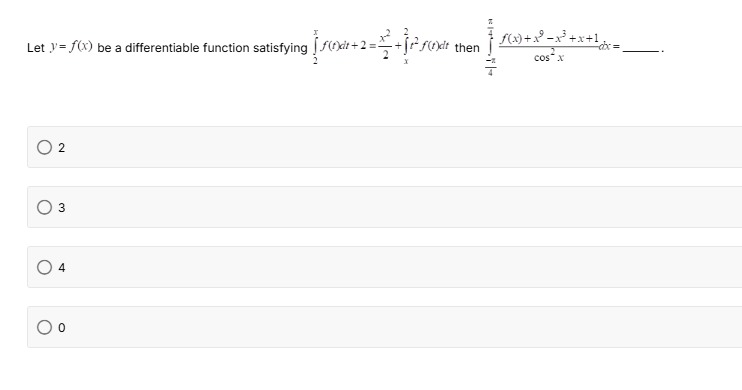Question
Question: Let $y=f(x)$ be a differentiable function satisfying $\int_2^x f(t) dt + 2 = \frac{x^2}{2} + \int_x^...
Let y=f(x) be a differentiable function satisfying ∫2xf(t)dt+2=2x2+∫x2t2f(t)dt then \int_{-\frac{\pi}{4}}^{\frac{\pi}{4}} \frac{f(x)+x^9-x^3+x+1}{\cos^2 x} dx = \text{_______}.

2
Solution
-
Find f(x): The given equation is ∫2xf(t)dt+2=2x2+∫x2t2f(t)dt. Rewrite the equation as ∫2xf(t)dt+∫2xt2f(t)dt=2x2−2. Differentiate both sides with respect to x using the Fundamental Theorem of Calculus: f(x)+x2f(x)=x. (1+x2)f(x)=x. Thus, f(x)=1+x2x.
-
Evaluate the definite integral: The integral to evaluate is I=∫−4π4πcos2xf(x)+x9−x3+x+1dx. Substitute f(x)=1+x2x: I=∫−4π4πcos2x1+x2x+x9−x3+x+1dx. Let the numerator be N(x)=1+x2x+x9−x3+x+1 and the denominator be D(x)=cos2x. The interval of integration is [−4π,4π], which is symmetric about x=0.
-
Analyze the parity of the integrand: The denominator D(x)=cos2x is an even function since cos2(−x)=cos2x. Let's analyze the numerator N(x). We know f(x)=1+x2x is an odd function since f(−x)=1+(−x)2−x=−f(x). Let's check N(−x): N(−x)=f(−x)+(−x)9−(−x)3+(−x)+1 N(−x)=−f(x)−x9+x3−x+1. Now, consider N(x)+N(−x): N(x)+N(−x)=(1+x2x+x9−x3+x+1)+(−1+x2x−x9+x3−x+1) N(x)+N(−x)=2. This means N(x)=2N(x)+N(−x)+2N(x)−N(−x)=22+2N(x)−N(−x)=1+2N(x)−N(−x). The term 2N(x)−N(−x) is an odd function: 2N(x)−N(−x)=21[(1+x2x+x9−x3+x+1)−(−1+x2x−x9+x3−x+1)] =21[1+x22x+2x9−2x3+2x]=1+x2x+x9−x3+x. This is indeed an odd function. So, N(x)=1+(an odd function).
The integrand is D(x)N(x)=cos2x1+(odd function)=cos2x1+cos2xodd function. The term cos2xodd function is an odd function (odd/even = odd). The integral of an odd function over a symmetric interval [−a,a] is 0. So, ∫−4π4πcos2xodd functiondx=0.
-
Calculate the remaining integral: We are left with I=∫−4π4πcos2x1dx. I=∫−4π4πsec2xdx. The antiderivative of sec2x is tanx. I=[tanx]−4π4π=tan(4π)−tan(−4π). Since tan(4π)=1 and tan(−4π)=−1, I=1−(−1)=1+1=2.
The value of the integral is 2.
